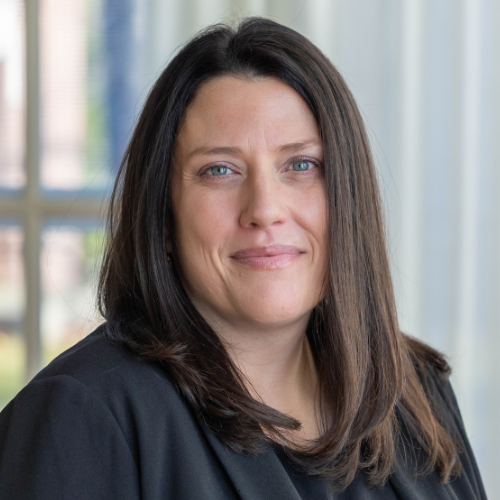M.Ed. in Mathematics, 5-8 Courses
The Master of Education (M.Ed.) in Mathematics, 5-8 is a 30-to-36-credit degree program leading to a master's degree in education and Massachusetts initial licensure in mathematics, 5-8. All courses meet over a seven-week term.
Program Prerequisite: A child development course or equivalent completed with a grade of B or better.
Core Coursework
All M.Ed. students are required to take these five core courses before completing the additional coursework for their specialization or licensure. Students can choose to take these core courses online or in-person at our locations in Easton, Boston or Cape Cod.
This course covers current policy and practice related to English Learners (ELs) in schools with a special focus on Sheltered English Immersion (SEI) Settings. Topics will include diversity issues, content/academic vocabulary development and literacy skills (including listening, speaking, reading and writing) to provide teachers with the knowledge and strategies to support ELs in classrooms.
*May be waived with documented, state-approved sheltered English immersion (SEI) endorsement.
This course introduces students to the reality of schools as diverse spaces encompassing a range of student needs and examines efforts to ensure equity in education. Issues of race, class, culture, language, gender, gender identity and expression, sexual orientation, and ability will be discussed & examined, especially how they intersect to reproduce inequality. Students will reflect on individual beliefs in relation to social justice education and democratic education and examine unintended consequences of policy/practice that create or perpetuate inequitable environments and opportunities in schools. Strategies for promoting educational equity and inclusivity will be discussed.
This course examines and unpacks contemporary issues in the field of education and provides prospective teachers with a beginning foundation for understanding the teaching profession and the U.S. education system, including policy and governance. The historical, legal, ethical, and pedagogical foundations for social justice education and democratic education will be explored, as well as the education reform context and emerging policies. The course will include an examination of professional ethics and standards.
Required field experience.
This course explores supportive, preventative, and proactive approaches to addressing the social and academic behaviors of students with disabilities and other diverse populations. Strategies for developing a positive classroom climate to support social and emotional development, including trauma and anxiety, will be central to the learning of the course. A variety of approaches, including the connection between communication & behavior, identifying contributing factors to challenging behavior, FBA, and behavior support plans will be explored.
This course is taken concurrently with a graduate practicum or internship. This capstone seminar will focus on social justice education, professional culture, family & community engagement, collaboration, and curriculum and planning for educational contexts. Students will reflect on experiences in the practica/internship site and current issues and best practice in education, including trauma and social emotional learning.
Courses may be waived based on previous coursework, which may reduce the total number of program credits.
Total program credits: 30–36
Total minimum credits: 30*
Mathematics, 5-8 Licensure Courses
This three-credit course is designed for future teachers and covers topics such as number sense, number systems and the meaning of operations. It also includes discussions on fractions, ratios, proportions, and number theory. The course explores the developmental progressions and learning trajectory in children regarding number and operations.
This three-credit course is designed for future teachers and covers algebra, functions, and fundamental concepts of calculus. It also explores the relationship of these concepts to the mathematics taught in elementary and middle school. The topics covered include the transition from arithmetic to algebra, exploration of expressions and equations, connecting algebra to functions, families of functions, sequences and series, limits, differentiation, and integration.
This three-credit course is designed for future teachers and delves into the fundamentals of Euclidean geometry to provide an in-depth understanding. It explores geometric concepts relevant to elementary and middle school mathematics, emphasizing an explorative approach supported by technological tools such as dynamic geometry software.
This three-credit course examines major mathematics concepts and applications of statistics and probability. It also explores the relationship of these concepts to the mathematics taught in elementary and middle school and explores effective teaching practices. The topics covered in this class include quantitative literacy, variability, statistical inference, probability, and statistical modeling.
This three-credit course provides an in depth look at the teaching and learning of mathematics in the middle school (grades 5-8). Students will acquire an understanding of the content (ratio and proportionality; expressions and equations; statistics and probability; the number system; geometry; and functions) and practices of middle school mathematics along with highly effective instructional practices for teaching mathematics to early adolescents. This course is centered around high leverage routines, problem-based learning, and authentic assessment for mathematics in the middle school.
Practicum
In this course, teacher candidates will spend the semester within a fieldwork setting aligned with their area of licensure. Teacher candidates will design and implement cross-cutting lessons in their area of licensure and will also have experience evaluating and utilizing high-quality curricular materials, collaborating across the school setting, assessing students’ understanding, and designing individualized plans for students. Teacher candidates will receive targeted feedback throughout the semester from a qualified supervising practitioner and Stonehill course instructor.
Graduate clinical licensure capstone. Candidates spend a full semester in a middle school math placement to gain teaching experience while assuming gradual responsibility of the teaching role, culminating with a takeover of all responsibilities of a math teacher.
Contact Information
